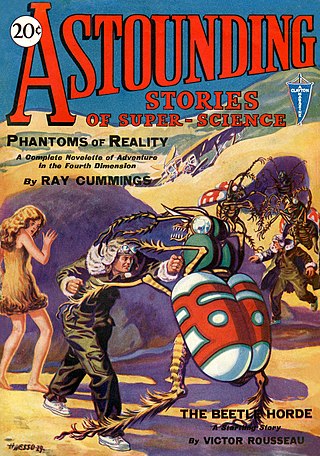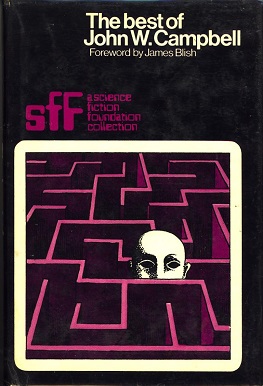
John Wood Campbell Jr. was an American science fiction writer and editor. He was editor of Astounding Science Fiction from late 1937 until his death and was part of the Golden Age of Science Fiction. Campbell wrote super-science space opera under his own name and stories under his primary pseudonym, Don A. Stuart. Campbell also used the pen names Karl Van Kampen and Arthur McCann. His novella Who Goes There? was adapted as the films The Thing from Another World (1951), The Thing (1982), and The Thing (2011).

Jerry Eugene Pournelle was an American scientist in the area of operations research and human factors research, a science fiction writer, essayist, journalist, and one of the first bloggers. In the 1960s and early 1970s, he worked in the aerospace industry, but eventually focused on his writing career. In an obituary in Gizmodo, he was described as "a tireless ambassador for the future."

Charles Sheffield, was an English-born mathematician, physicist and science-fiction writer who served as a President of the Science Fiction and Fantasy Writers of America and of the American Astronautical Society.

Henry Beam Piper was an American science fiction writer. He wrote many short stories and several novels. He is best known for his extensive Terro-Human Future History series of stories and a shorter series of "Paratime" alternate history tales.
William F. Wu is a Chinese-American science fiction, fantasy, and crime author.

"Omnilingual" is a science fiction short story by American writer H. Beam Piper. Originally published in the February 1957 issue of Astounding Science Fiction, it focuses on the problem of archaeology on an alien culture.

Space Viking is a science fiction novel by American writer H. Beam Piper, set in his Terro-Human future history. It tells the story of one man's search for his wife's murderer and its unexpected consequences. The story was originally serialized in Analog magazine, then published by Ace Books in 1963.
John Francis Carr is an American science fiction editor and writer as well as the executor of the literary estate of H. Beam Piper.

Lord Kalvan of Otherwhen is a 1965 science fiction novel by American writer H. Beam Piper; it is part of his Paratime series of stories, and was expanded by John F. Carr to form the Kalvan series. It recounts the adventures of a Pennsylvania state trooper who is accidentally transported to a more backward parallel universe. It was published posthumously, making it Piper's final science fiction novel.
The Paratime series written by H. Beam Piper and subsequently by John F. Carr consists of several short stories, one novella, and one novel, all but one of which were originally published in Astounding Science Fiction under the editorship of John W. Campbell. The series deals with an advanced civilization that is able to travel between parallel universes with alternate histories, and uses that ability to trade for goods and services that its own, exhausted Earth cannot provide. The protagonists of the stories are the Paratime Police, the organization that protects the secret of paratime travel.
Jayge Carr is the pen name of American science fiction and fantasy author Margery Ruth Morgenstern Krueger, also known as Margery Krueger and Marj Krueger, a former nuclear physicist for NASA. She is best known for her "Rabelais" series.
"He Walked Around the Horses" is a science fiction short story by American writer H. Beam Piper. It is initially based on the true story of diplomat Benjamin Bathurst, who mysteriously disappeared in 1809. It was first published in the April 1948 issue of Astounding Science Fiction magazine. The story is told in epistolary style, as a series of reports, statements and memoranda by various government, army and police officials, and inn servants, stating what they know of the matter.
Michael Joseph Cassutt is an American television producer, screenwriter, and author. His notable TV work includes producing or writing, or both, for The Outer Limits, Eerie, Indiana, Beverly Hills, 90210, and The Twilight Zone. In addition to his work in television, Cassutt has written over thirty short stories, predominately in the genres of science fiction and fantasy. He has also published novels, including the 1986 The Star Country, the 1991 Dragon Season, the 2001 Red Moon and the 2011 Heaven's Shadow, in collaboration with David S. Goyer. In addition, Cassutt contributes non-fiction articles to magazines and is the author of the non-fiction book, The Astronaut Maker, a biography of NASA legend George W. S. Abbey (2018).

Analog Science Fiction and Fact is an American science fiction magazine published under various titles since 1930. Originally titled Astounding Stories of Super-Science, the first issue was dated January 1930, published by William Clayton, and edited by Harry Bates. Clayton went bankrupt in 1933 and the magazine was sold to Street & Smith. The new editor was F. Orlin Tremaine, who soon made Astounding the leading magazine in the nascent pulp science fiction field, publishing well-regarded stories such as Jack Williamson's Legion of Space and John W. Campbell's "Twilight". At the end of 1937, Campbell took over editorial duties under Tremaine's supervision, and the following year Tremaine was let go, giving Campbell more independence. Over the next few years Campbell published many stories that became classics in the field, including Isaac Asimov's Foundation series, A. E. van Vogt's Slan, and several novels and stories by Robert A. Heinlein. The period beginning with Campbell's editorship is often referred to as the Golden Age of Science Fiction.

The Worlds of H. Beam Piper is a collection of short stories written by H. Beam Piper, and edited by John F. Carr. The book was published in 1983 by Ace Books. None of these stories take place in either Piper’s Terro-Human Future History series nor in his Paratime series, except for "Genesis" which fits in with both series.

Empire is a collection of short stories by American writer H. Beam Piper, edited by John F. Carr. The book was published in 1981 by Ace Books, and again in 1986. Most of these stories take place in his Terro-Human Future History, with the sole exception being "The Return".
"When in the Course" is a science fiction short story by American writer H. Beam Piper. It is a part of Piper's Terro-Human Future History series, and is nearly identical with his 1964 Paratime short story "Gunpowder God", which was later expanded into the novel Lord Kalvan of Otherwhen. It is most likely set in the 3rd century A.E.

World's Best Science Fiction: 1965 is an anthology of science fiction short stories edited by Donald A. Wollheim and Terry Carr, the first volume in a series of seven. It was first published in paperback by Ace Books in 1965. It was reprinted by the same publisher in 1970 under the alternate title World's Best Science Fiction: First Series.

The Best Science Fiction of the Year #11 is an anthology of science fiction short stories edited by Terry Carr, the eleventh volume in a series of sixteen. It was first published in paperback by Pocket Books in July 1982, and in hardcover by Gollancz in the same year.

The Best of John W. Campbell is the title of two collections of science fiction short stories by American author John W. Campbell. The first, a British edition edited by George Hay, was first published in hardcover by Sidgwick & Jackson in February 1973, and in paperback by Sphere Books in November 1976. Sidgwick & Jackson later gathered together with The Far-Out Worlds of A. E. van Vogt (1968) into the omnibus volume Science Fiction Special 15 (1975), and with Brian N. Ball's Singularity Station (1973) and Poul Anderson's Orbit Unlimited (1961) into the omnibus volume Science Fiction Special 20 (1977). The second collection of this title, an American edition edited by Lester del Rey, was first published in hardcover by Nelson Doubleday in May 1976, and in paperback by Ballantine Books in June 1976 as a volume in its Classic Library of Science Fiction. The American edition was reprinted by Del Rey/Ballantine in February 1995, and has also been translated into German.













